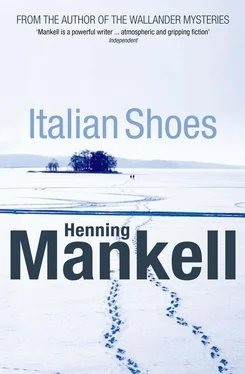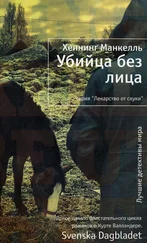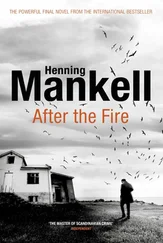He could hide from the wind, but there was nowhere to hide from death.
I carried his body back to the house. It was heavier than I had expected. The dead are always heavy. I fetched a pickaxe and slowly hacked a big enough hole under the apple tree. The cat sat on the steps, watching the whole procedure. The dog’s body was stiff as I pressed him down into the hole, then filled it in.
I leaned the pickaxe and the spade against the house wall. The morning fog had returned, but now my eyes had misted over too. I was grieving for my pet.
I noted the death in my logbook, and calculated that the dog had been nine years and three months old. I had bought him as a puppy from one of the old trawlermen who used to breed dogs of doubtful descent.
For some time I considered acquiring another dog; but the future was too uncertain. Before long my cat would also be gone. Then there would be nothing to tie me down to the island if I no longer wanted to stay here.
I wrote to Louise and Harriet about the death of the dog. Both times I burst into tears.
Louise understood how I must miss him, while Harriet wondered how I could possibly feel sad about an old cripple of a dog who was finally at peace.
Weeks passed, and still I didn’t start work on the boat. It was as if I were waiting for something to happen. Perhaps I ought to write a letter to myself, and explain what my plans for the future were?
The days became longer. The snow in the rock crevices started to melt. But the sea was still frozen.
In the end, the ice began to lose its grip. I woke up one morning to find navigable channels running all the way to the open sea. Jansson arrived in his motorboat: he had put the hydrocopter in store. He had decided to buy a hovercraft in time for next winter. I’m not sure that I understood what a hovercraft was, despite the fact that he gave me a detailed description without my asking for it. He begged me to examine his left shoulder. Could I feel that there was a lump there? Might it be a tumour?
There was nothing. Jansson was still as fit as a fiddle.
That same day I removed the tarpaulin from the boat, and started to scrape the shell. I managed to clear the stern of old paint.
My intention was to continue the following day. But something happened to prevent that. As I was on my way down to take my morning bath, I discovered that a little motorboat was beached by the jetty.
I stopped dead and held my breath.
The door to the boathouse was open.
Somebody had come to pay me a visit.
There was a glint of light inside the boathouse. Sima emerged from the darkness, sword in hand.
‘I thought you were never going to wake up.’
‘How did you get here? What’s that boat you’ve beached down by the jetty?’
‘I took it.’
‘Took?’
‘From the harbour. It was locked. But the chain that can stop me hasn’t been invented yet.’
‘You mean you stole the boat?’
My cat had come to the jetty, and was observing Sima from a distance.
‘Where’s your dog?’
‘He’s dead.’
‘What do you mean, dead?’
‘Dead. There’s only one kind of dead. When you’re dead, you’re not alive. Unalive. Dead. My dog is dead.’
‘I had a dog once. It’s dead as well.’
‘Dogs die. My cat won’t live much longer either. She’s also old.’
‘Are you going to shoot it? Do you have a rifle?’
‘I wouldn’t dream of telling you. I want to know what you’re doing here, and why you stole a boat.’
‘I wanted to see you.’
‘Why?’
‘Because I didn’t like you.’
‘You wanted to see me because you don’t like me?’
‘I want to know why I don’t like you.’
‘You’re mad. How come you know how to handle a boat?’
‘I spent some time at a reform school on the shore of Lake Vättern. They had a boat.’
‘How did you know where I lived?’
‘I asked an old bloke sweeping up leaves outside the church. It wasn’t hard. I just asked about a doctor who’d hidden himself away on an island. I told him I was your daughter.’
I gave up. She had an answer to every question. Hugo Persson was employed to keep the churchyard in good order, and I knew he was a gossip. He had presumably told the girl how to get here — it wasn’t difficult: straight out towards Mittbåden where the lighthouse was, then through the Järnsundet channel with the high cliffs on either side, and so to my island, where there were two broom beacons close to the rocks at the mouth of the inlet to my boathouse.
I could see that she was tired. Her eyes were dull, her face pale, her hair carelessly pinned up with cheap hairslides. She was dressed entirely in black, and her trainers had a red stripe.
‘Come with me to the house,’ I said. ‘You must be hungry. I’ll get you some food. Then I’ll call the coastguards and tell them that you’re here, and that you’ve stolen a boat. They can come and fetch you.’
She said nothing, nor did she threaten me with her sword. When we’d settled down in the kitchen, I asked her what she wanted.
‘Porridge.’
‘I didn’t think people ate porridge any more.’
‘I’ve no idea what people do. But I want porridge. I can make it myself.’
I had some oats, and a tin of apple sauce that wasn’t too far past its use-by date. She made the porridge very thick, pushed the tin of apple sauce out of the way and filled up her bowl with milk. She ate slowly. The sword was lying on the table. I asked if she wanted coffee or tea. She shook her head. She wanted only porridge. I tried to work out why she’d come to the island to visit me. What did she want? The last time we’d met, she had come running at me with the sword brandished over her head. Now she was sitting at my kitchen table, eating porridge. It didn’t make sense. She rinsed out her bowl and stood it on the draining board.
‘I’m tired. I need to get some sleep.’
‘There’s a bed in that room over there. You can sleep there. But I should warn you that there’s an anthill in the room. And as it’s spring now, they’ve started to become active.’
She believed me. She’d been doubtful about whether my dog was dead, but she believed what I said about the anthill. She pointed at the sofa in the kitchen.
‘I can sleep there.’
I gave her a pillow and a blanket. She didn’t take any clothes off, nor did she remove her shoes; she just pulled the blanket over her head and fell asleep. I waited until I was sure, then went to get dressed.
Accompanied by the cat, I went back to the inlet. The boat was a Ryd with a Mercury outboard motor, 25 h.p. The bottom of the boat had scraped hard against the stones on the seabed. There was no doubt that she had beached the boat intentionally. I tried to see if the plastic had split, but I couldn’t find any holes.
It was a post day: Jansson would notice the boat. I had only a few hours in which to decide what to do. It wasn’t a foregone conclusion that I would in fact call the coastguards. If possible, I would prefer to persuade her to go back to Agnes without the authorities being involved. I also had my own interests to think about. It was hardly appropriate for an old doctor to be visited by runaway girls who stole boats.
With the aid of a boathook and a plank used as a lever, I managed to get the boat back into the water. I used the boathook to propel it as far as the jetty and tied it to the stern of my little rowing boat. There was an electric starter, but it needed a key and, needless to say, that hadn’t been in the ignition when Sima stole the boat. She had used the drawstring, and I did the same. The engine started at the fourth attempt. The propeller and pinion were undamaged. I reversed away from the jetty, and aimed the boat at two rocky skerries known as the Sighs. Between them was a small natural harbour hidden from view. I could leave the stolen boat there for the time being.
Читать дальше












